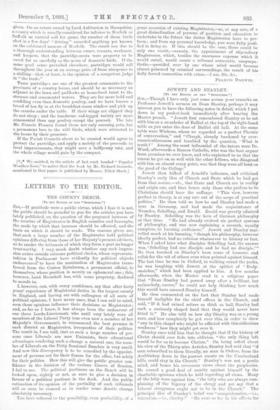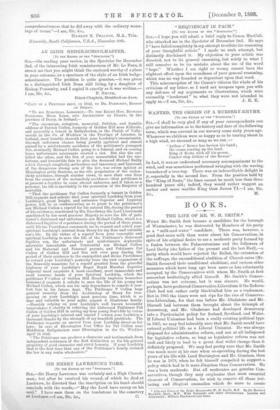JOWETT AND STANLEY.
[To THE EDITOR Or THE "SPECTATOR."] SIR,—Though I have only just come across your remarks on Professor jowett's sermon on Dean Stanley, perhaps it may interest you to have the following notes in detail, which I put down in my pocket-book immediately after bearing the Master preach. "Jowett first remembered Stanley as he sat with him as a co-scholar of Balliol at the top of the right-hand table as you enter the door of Balliol old hall. At the same table were Wickens, whom we regarded as a perfect Phoenix of conversation," and "Clough, already burdened by over- conscientiousness and troubled by the question, 'What is truth P ' Among the most influential of the tutors were Dr. Ward, afterwards a Roman Catholic, who was the best arguer from premises we ever knew, and who explained to us that the reason he got on so well with the other fellows, who disagreed with him on almost every point, was that they were all bent on the good of the College."
Jewett then talked of Arnold's influence, and criticised Stanley's early idea of Church and State which he had got from that source,—viz., that State and Church are in reality and origin one, and that hence only those who profess to be Christiana should have the suffrage. "This view, however perfect in theory, is at any rate out of the scope of practical politics." He then told us how he and Stanley had made a tour in Germany, and had made the acquaintance of Neander, Schelling, and Ewald. Ewald was greatly admired by Stanley. Schelling was the hero of German philosophy at that time. "He had already evolved six perfect systems of philosophy, and was now explaining a seventh, equally complete, to burning audiences." Jowett and Stanley mar- velled much at his learning, "though his philosophy, however ideally perfect, had no relation whatsoever to history or fact. When I asked later what disciples Schelling had, the answer was, Schelling had one disciple and be had no disciple."
He then touched on Stanley's keen sense of humour, and relish for the wit of others even when pointed against himself. The last time he was in Oxford, in walking round the parks, he was laughing with Jowett at the epithet of "Body- snatcher," which bad been applied to him. A few months afterwards, when the Master read in a religious paper that "Dean Stanley had passed away after a brilliant, but melancholy, career," he could not help thinking how much this would have amused Stanley himself.
He then commented on the fact that Stanley had made himself ineligible for the chief offices in the Church, and said, "If it had rained mitres as thick as hail, Stanley had such a curiously shaped head that they would never have fitted it." He also told us how shy Stanley was as a young man, and how completely he got over this, in order to show "any in this chapel who might be afflicted with this ridiculous weakness" how they might get over it. Stanley once told him that he thought that if the history of Christ should ever fade into oblivion, "the only thing left would be for us to become Christs." On being asked about his view of the Thirty-nine Articles, Stanley had said that "if men subscribed to them literally, no man in Orders, from the Archbishop down to the poorest curate on the Cumberland hills, could stay in the Church." Stanley's was not a poetic mind, and hence his erroneous views about the prophecies. He roused a good deal of enmity against himself by the charitable opinions which he held regarding all views. Many of the laity were against him, "the laity who are always com- plaining of the bigotry of the clergy and yet say that a Liberal clergyman ought not to be in the Church." The principal idea of Stanley's belief was " comprehension,—i.e., toleration,—i.e., charity." "He went so far in his efforts for comprehensiveness that he did away with the ordinary mean- ings of terms."—I am, Sir, &o.,







































 Previous page
Previous page